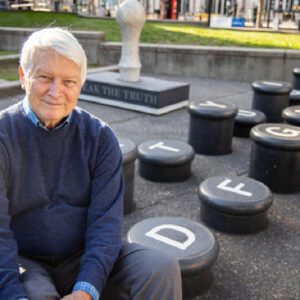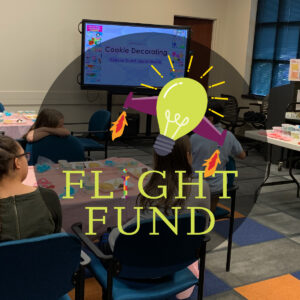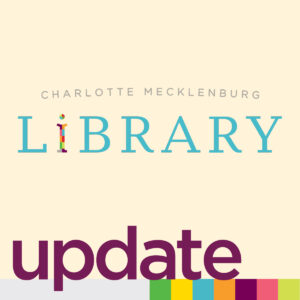“a recurring character in the lives of readers and writers”
Since National Library Week runs from April 19 through April 25, now is a fitting time to celebrate the many ways the Charlotte Mecklenburg Library contributes to Charlotte’s community of readers and writers. Even though library branches are closed because of the coronavirus outbreak, our public library is still providing online support to area readers and writers, and the library is still participating in National Library Week.
Whenever I talk with Charlotte writers about the public library, they have stories to tell. I will focus on three whose connections with the Charlotte Mecklenburg Library have especially deep roots. One is Jeffrey Leak, whose books include Racial Myths and Masculinity in African American Literature and Visible Man: The Life of Henry Dumas. Another is my wife, Nancy Northcott. Her fiction includes The Herald of Day, the first novel in a historical fantasy trilogy, and a novella in Welcome to Outcast Station, the first in a science fiction series. Both Jeffrey and Nancy grew up in the Charlotte area, and their library connections go back to their childhoods. The third is community historian Thomas Hanchett, whose books include Sorting Out the New South City: Race, Class and Urban Development in Charlotte, 1875-1975 and Charlotte and the Carolina Piedmont. I asked each author to send me a paragraph about their experiences with our Charlotte Mecklenburg Library.
From Jeffrey Leak:
“I have a long-standing appreciation for the public library. I grew up near what is now Northwest School of the Arts, riding my bike in the summer to the library, then on LaSalle Street, now on Beatties Ford Road. My journeys there were the result of an ultimatum from my mama: ‘if you come in my house one more time, you’ll be in till this evening.’ Tired of me running in and out, Hattie Leak told me to make up my mind. Inside or outside. Heat or AC. More times than not, I chose the former. The librarians understood my dilemma, sometimes even including me on their lunch-run to Hoyles or Mr. C’s, less than a block away. But the main thing they gave me was access to books and the encouragement to read them. African American history and culture came alive in that welcoming space. From reading there, I always wanted to travel to the northeast where figures like Benjamin E. Mays and Zora Neale Hurston had gone. These black librarians took my curiosity and interests and, like the story of Jesus and the feeding of the fish to the multitudes, multiplied them. I don’t have any data to support this claim, but I think my reading skills actually improved in those pre-teen summers. What I do know is that my education has taken me to points in the northeast, including Maine and New York City (the respective places associated with Mays and Hurston), Africa, Europe and the Caribbean. Oh the places I have been! But I’ll always know that much of what I have been blessed to experience started at the library on LaSalle.
From Nancy Northcott:
As a geek child, I didn’t fit in with my more athletic, outdoorsy neighbors. I found a haven in the Davidson Public Library. I loved to ride my bike down to Main Street, check out as many books as the bike’s basket would hold, and pedal home to start reading. Mrs. Wally, the librarian, often had recommendations ready when I walked in the door. She knew I loved science fiction, history, historical fiction, mysteries, and YA romance, and her suggestions ran the gamut. I reveled in the imaginary journeys those books provided. The library was also special to me because my father and I often went there together. Those trips were the one activity only the two of us shared. Every couple of weeks, after supper, he would ask if I wanted to go. I always jumped at the chance. You can bring home so many more books when you have a car! During those visits, I regularly read the comic strips in the back of Boys’ Life magazine. I wanted a subscription, but my mom nixed that on grounds of my not being a boy. When my dad and I went to the library, I always took the latest Boys’ Life off the shelf and read the comics in the back. He knew but never commented, so that also was just between us. I check out much less fiction than I once did, but I love having the library available for research materials. It’s probably fair to say I wouldn’t have become a writer if the library hadn’t stimulated my imagination all those years ago.
From Tom Hanchett:
When I’m researching the history of a community, the local public library is always my first stop. I’ve used history collections in dozens of cities nationwide and I can tell you for sure that the Robinson-Spangler Carolina Room is among the best in the U.S. Arriving in Charlotte back in 1981 to research older neighborhoods for the Historic Landmarks Commission, I went directly to the original Carolina Room. It was then a single room staffed by a single person, Mary Louise Phillips. I wasn’t sure what she would make of a this 26-year-old non-native, barely able to find Charlotte on a map, asking so many questions about Myers Park, Biddleville, cotton mills, land development. But she welcomed me in. The Carolina Room has been a home-base ever since. Today I’m delighted to be finishing my term as the Carolina Room’s first Historian-in-Residence, thanks to the vision of Library CEO Lee Keesler. In partnership with fellow community historian J. Michael Moore, we’ve just debuted a how-to website of tools, tips and weblinks for researching your house or neighborhood in Charlotte CharlotteHistoryToolkit.com. More work I’ve done over the years, drawing on the Carolina Room, can be found at my website www.HistorySouth.org. And while you’re on the internet, check out the Carolina Room’s own rich website, www.CMstory.org.
As Jeffrey, Nancy and Tom reveal, the Charlotte Mecklenburg Library has played a significant role in these writers’ lives. In a sense, the public library can be seen as a recurring character that plays a variety of roles in the individual stories of Charlotte’s readers and writers, and a central character in the overarching narrative of Storied Charlotte.
Mark I. West is a professor of English at UNC Charlotte, where he has taught since 1984. He regularly teaches courses on children’s and young adult literature. He has written or edited 16 books, the most recent of which is Shapers of American Childhood, which he co-edited with Kathy Merlock Jackson. His articles have appeared in various national publications including The New York Times Book Review, Publishers Weekly, Americana, and British Heritage, as well as many academic journals. Before entering academia, he worked as an early childhood educator and professional puppeteer. This post originally appeared on Mark’s blog, Storied Charlotte, and is reprinted here lightly edited and with his permission.



